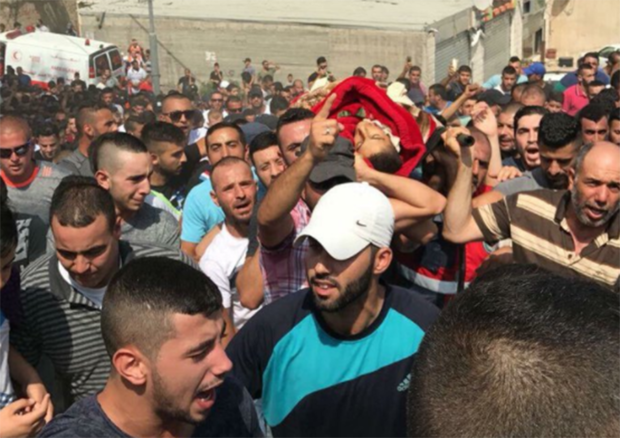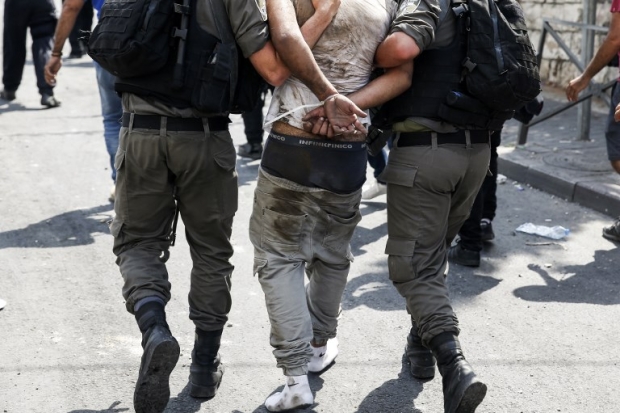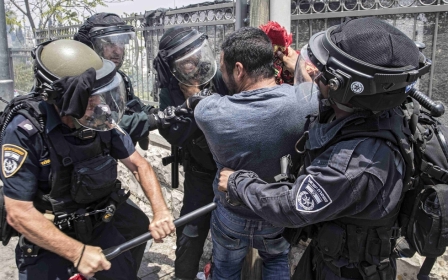Palestinians recount fatal hospital confrontation with Israeli police

JERUSALEM - Mohammed Abu Ghanam was rushed into al-Makassed hospital, in East Jerusalem, with a bullet in a major blood vessel close to his heart, after thousands of Palestinian worshippers clashed with security forces on a "day of rage" on Friday over Israeli control of Islam's third-holiest site.
The 19-year-old was nearly dead, and his medical team was making a last ditch effort to save him by performing cardiac massage.
They had to get him into surgery fast, but in the corridor of the hospital they were stopped by a force of Israeli police, and the doctor in charge was beaten, according to two nurses who were present at the time.
Each minute counts in those situations where someone's life is at risk
- Nurse, al-Makassed Hospital
"Each minute counts in those situations where someone's life is at risk," one of the nurses told Middle East Eye.
"They stopped us for perhaps five minutes in the hall and beat one of the doctors who was attempting to resuscitate the patient."
Ghanam, who had been shot by the Israeli police during clashes in At Tur, on the Mount of Olives in East Jerusalem, died of his injuries soon after.
Two other Palestinians were shot dead and four were wounded as thousands of Palestinians clashed with police after peaceful prayers around the Old City.
Many had refused to enter the Haram esh-Sharif, or Noble Sanctuary, compound (also known as the Temple Mount), and the Al-Aqsa mosque there in protest of new Israeli security checkpoints at two key entrances.
The sanctuary has for a week been subjected to increased security measures, including metal detectors, that many in Palestine see as an attempt to gain control of the site.
Raiding hospitals
Al-Makassed is the only Palestinian hospital in East Jerusalem that has an emergency department.
"When things happen in the city, the wounded are brought here because it is the only choice," a nurse said. Both nurses told Middle East Eye that raids by the Israeli police were common after violent incidents in the city, as they came to look for wounded suspects.
One Palestinian, who spoke on the condition of anonymity, said he had gone to al-Makassed along with a number of other young men to donate blood following a call for donors.
"When we got there we heard that a guy had just arrived at the hospital after being shot on the Mount of Olives," he told Middle East Eye.
I have been at many clashes and I have never experienced rubber bullets fired like that
- Witness, al-Makassed hospital
"So then we knew that the police would likely come to raid the hospital, and the youth decided to try and prevent them by blocking the gates."
When police arrived, however, Palestinian youth were quickly driven off by rubber bullets and sound bombs, according to the source.
"I have been at many clashes, and I have never experienced rubber bullets fired like that. They were everywhere in the air around me and ricocheting off the walls," said the witness.
He said no stones were thrown at police before they arrived. "There was no intention to throw stones, and the youth had nothing in their hands. The police were throwing stun grenades at people as they ran away."
According to the two nurses, about 50 Israeli policemen entered the hospital and stayed for 20 to 30 minutes..
"The hospital is not a shop, it should be treated with respect," one of the nurses, who did not wish to be named, told MEE. "We just want to save lives, and any barrier placed in our way stops us from doing so."
Human rights concerns
The hospital's administration said in a statement that it was working with the International Committee of the Red Cross and the World Health Organisation to, "quickly and immediately and put an end to the chaos caused by the raids carried out by the Israeli occupation forces inside the hospital’s grounds and premises".
A police spokesman, Micky Rosenfeld, said the police units had gone to the hospital "to search for suspects directly involved in the riots".
He did not respond to a request for comment on the allegations that police had stopped a medical team from performing its work.
Omar Shakir, Human Rights Watch's Israel-Palestine director, was prevented from reaching the hospital on Friday by the Israeli police.
Shakir told MEE on Saturday that while he could not comment on the specific legality of Friday’s hospital raid, for any raid into a hospital to be lawful it should have a "targeted purpose ... [and] the impact on the operations of the hospital should be negligible".
Smuggling dead bodies
According to the nurses, once Mohammed Abu Ghanam was pronounced dead, people who had been waiting outside entered the operating theatre and took the body. Bodies of dead Palestinians are often held by the Israeli authorities for long periods, and the crowd appears to have feared that this would be repeated in Ghanam's case.
The witness who was waiting outside Makassed hospital said the crowd had resorted to distracting police on the scene as the body was smuggled out of the hospital.
"We went again to the gate and demonstrated to provide cover for the escape of the martyr."
Footage broadcast by Maan news agency showed a number of young men lifting the body over the back wall of the hospital.
He was later buried on the Mount of Olives amongst further clashes between mourners and the police. Shakir said HRW was still investigating Friday’s shootings, but he was deeply concerned about the use of force by the police.
"We regularly see authorities fail to hold to account those responsible for using excessive force. The use of live ammunition against demonstrators only portends more bloodshed," he said.
This article is available in French on Middle East Eye French edition.
Stay informed with MEE's newsletters
Sign up to get the latest alerts, insights and analysis, starting with Turkey Unpacked
Middle East Eye delivers independent and unrivalled coverage and analysis of the Middle East, North Africa and beyond. To learn more about republishing this content and the associated fees, please fill out this form. More about MEE can be found here.






